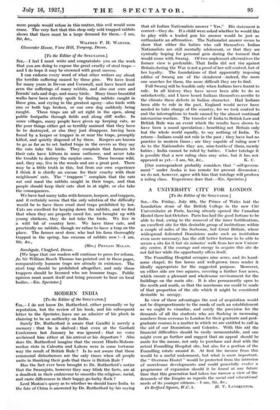MODERN INDIA
[To the Editor of the SPECTATOR.] Igta,—I do not know Dr. Rutherford, either personally or by reputation, but the review of his book, and his subsequent letter to the Spectator; leave me an admirer of his pluck in claiming to be an authority on India.
Surely Dr. Rutherford is aware that Gandhi is merely a memory : that he is shelved : that even at the Ganhati Conference last January he was ignored : that no voice acclaimed him either at his arrival or his departure ? Also does Dr. Rutherford imagine that the recent Hindu-Mahom- medan riots in Calcutta and Lahore were in some tortuous way the result of British Rule ? Is he not aware that these communal disturbances are the only times when all people unite in thanking their gods that there is British Rule ?
Has the fact ever been brought to Dr. Rutherford's notice that the Swarajists, however they may blink the facts, are at a deadlock in their endeavour to smoothe the religious, racial, and caste differences in their happy-go-lucky flock ?
Lord Meston's query as to whether we should leave India to the fate of China is answered by. Dr. Rutherford by his saying that all Indian Nationalists answer " Yes." His statement is correct—they do. If a child were asked whether he would like to play with a loaded gun his answer would be just as enthusiastic an affirmative.. The Nationalist answer seems to show that either the babies who call themselves Indian Nationalists are still mentally adolescent, or that they are cynically hoping for personal gain during the turmoil that would come with Swaraj. Of two unpleasant alternatives the former view is preferable. That India did not rise against Britain during the War is not a proof of her self-control, but of her loyalty. The foundations of that apparently imposing edifice of Swaraj are of the slenderest—indeed, the more one searches for them, the more difficult they are to find.
Full Swaraj will be feasible only when Indians have learnt to rule. In all history they have never been able to do so satisfactorily, and I have heard Indians themselves ascribe to the climate these defects in Indian character. Had Indians been able to rule in the past, England would never have needed to take charge of the country, for we took control to end the interruptions to trade caused by the almost continual internecine warfare. The transfer of India to British Law and British Rule was an event which the results have shown to have been a sound speculation ; benefiting not Britain only but the whole world equally, to say nothing of India. To return—Indians could not rule in the past ; they have had no practice in modern times ; are they capable of ruling now ? As to the Nationalists they are, nine-tenths of them, merely babies ; India cannot be ruled by babies. Under tutelage it is possible that a new ruling class may arise, but it has not appeared as yet.—I am, Sir, &c., K. C.
[Our correspondent probably considers that " self-govern- ment " under Asoka is too remote for present discussion ; we do not, however, agree with him that tutelage will produce a ruling class. Experience does that.—En. Spectator.]










































 Previous page
Previous page